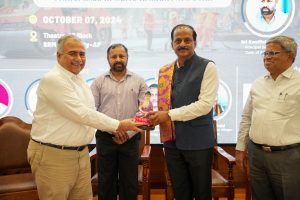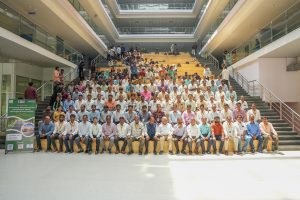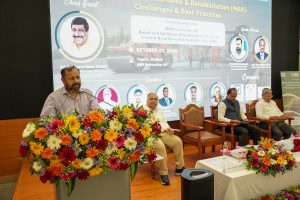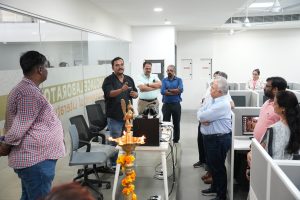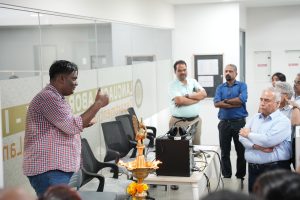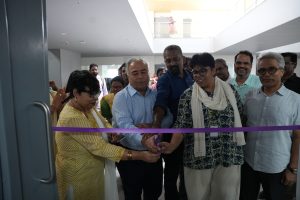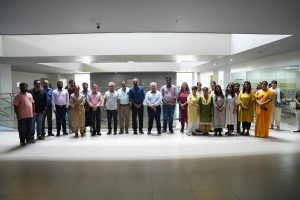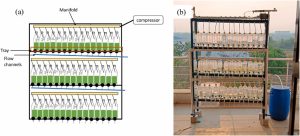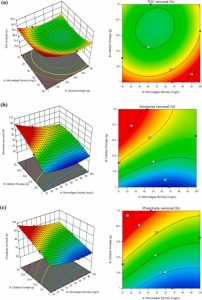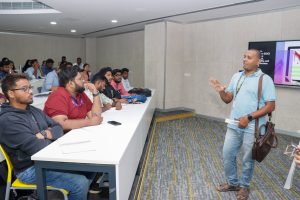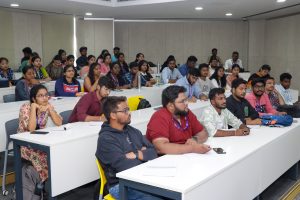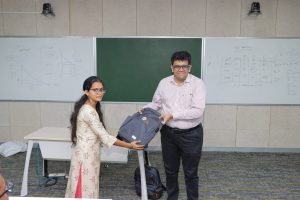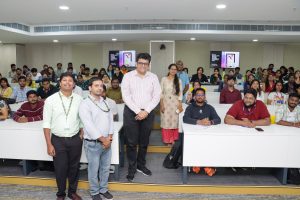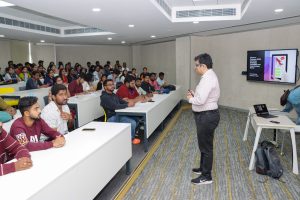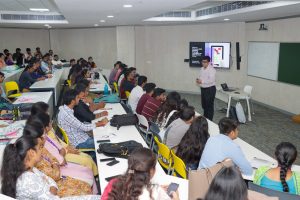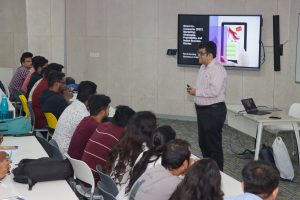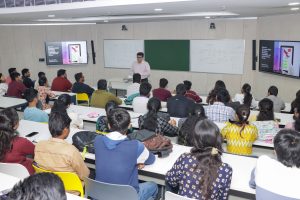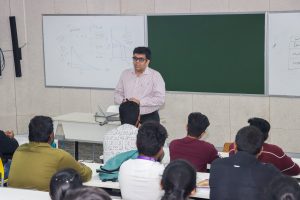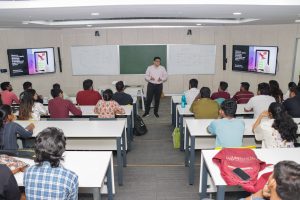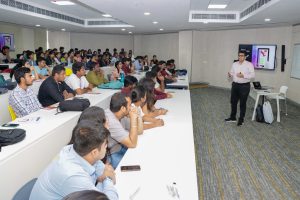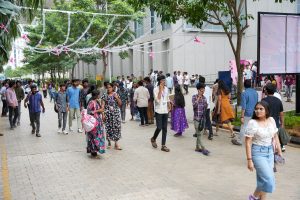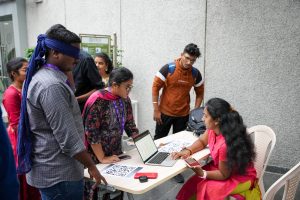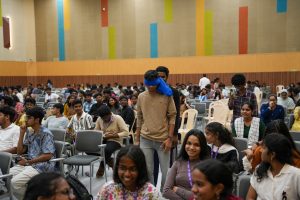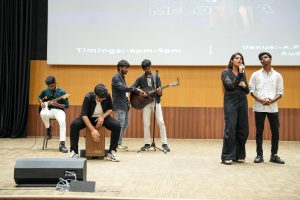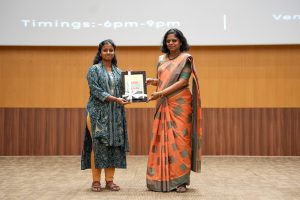All Management Events
- From Lab to Land: One-Day Workshop Hosted on Road Maintenance & Rehabilitation (M&R) October 8, 2024
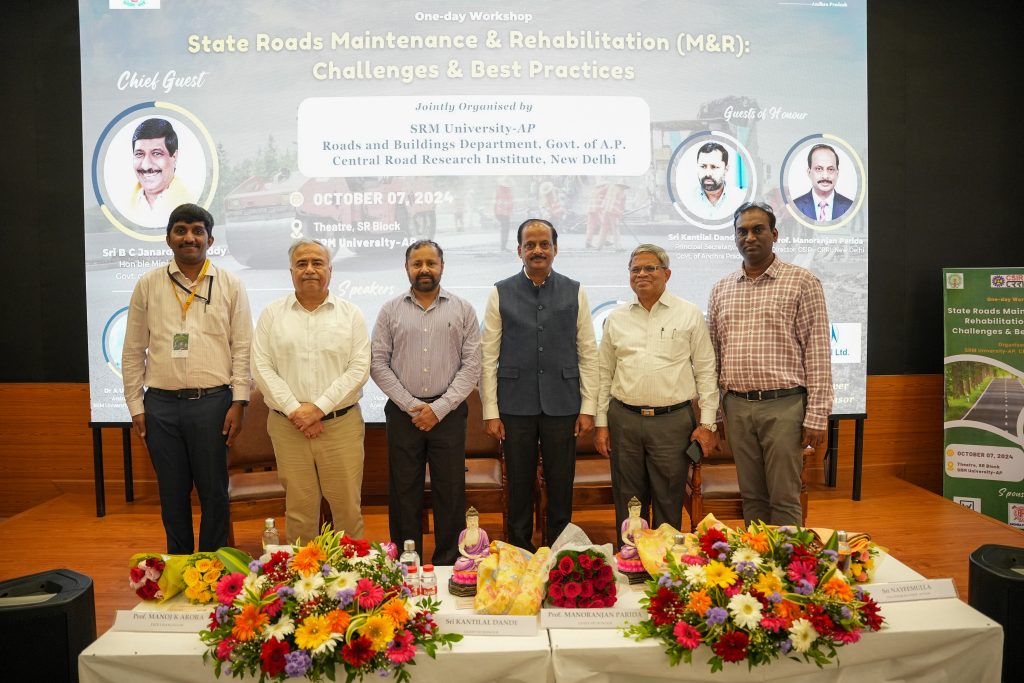
“Road is the index of a developed society” commented Sri Kantilal Dande IAS, Guest of Honour for the one-day workshop.
SRM University-AP, in association with the Andhra Pradesh Roads and Buildings (R&B) department and the Council of Scientific and Industrial Research-Central Road Research Institute (CSIR-CRRI), hosted a one-day workshop on exploring the Challenges and Best Practices for State Roads Maintenance and Rehabilitation (M&R). The ceremonious event welcomed the Honourable Minister of Roads & Buildings (R&B), Government of Andhra Pradesh, Sri B C Janardhan Reddy, as the Chief Guest along with Sri Kantilal Dande IAS, Principal Secretary, (R&B), Government of Andhra Pradesh and Prof. Manoranjan Parida, Director of CSIR-CRRI as the Guests of Honour. Distinguished dignitaries from the Government of Andhra Pradesh, the R&B Department, industries, universities, and research institutes participated in the workshop to address the critical challenges associated with the maintenance and rehabilitation of state roads.
In his virtual address to the participants, Honourable Minister Sri B C Janardhan Reddy explained that the Government had received proposals of Rs. 290 crores to convert 1393 damaged roads, covering 7071 kilometres, into pothole-free roads across the state. He said that with the latest technology and technical support from SRM University-AP, a complete restoration of the road network would be possible.
The event facilitated a constructive platform that assembled policymakers, academicians, researchers and young minds from various sectors to discuss the pressing challenges faced in the maintenance and rehabilitation of roads and exploring cost-effective and sustainable methods to achieve the same. “To tackle the key factors leading to road damage and rehabilitation, we require technical support and cutting-edge research from reputed institutes like CSIR-CRRI and new-age universities like SRM University-AP”, stated Guest of Honour Sri Kantilal Dande IAS.
Prof. Manoranjan Parida, Director of CSIR-CRRI, delivered a keynote session elucidating the immense significance of technology on road development. “A methodical approach to Road Asset Management is pivotal to ensure successful road maintenance and rehabilitation in the state of Andhra Pradesh. Sustainable technologies such as recycling technology can be utilised for rehabilitation projects, which will be cost-effective and economical”, advised Prof. Parida.
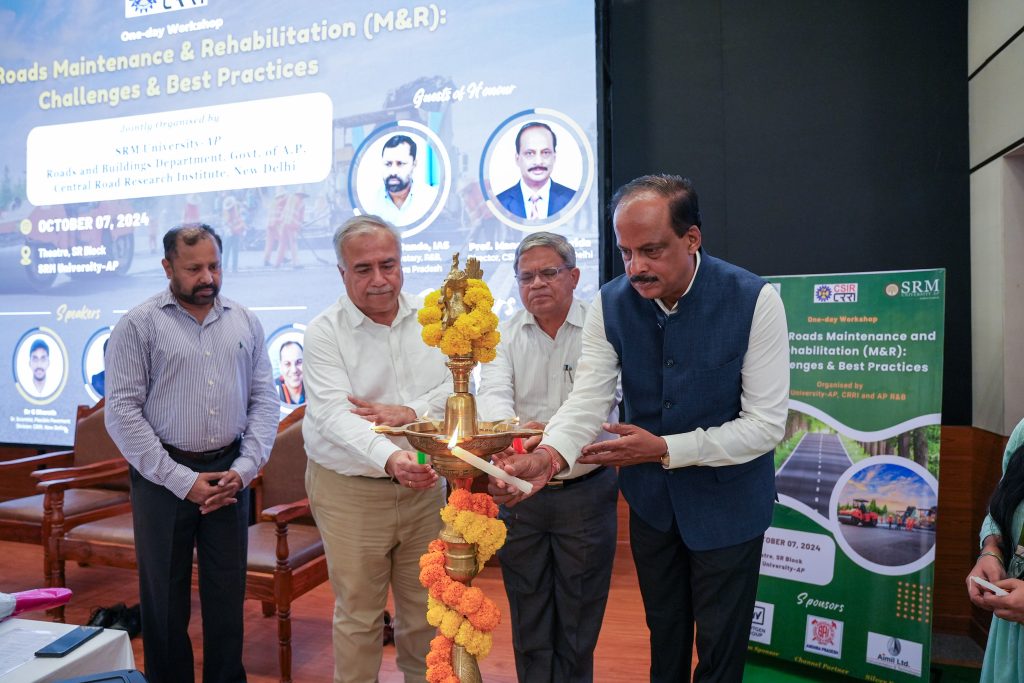
The workshop also encompassed insightful sessions on leading issues featuring esteemed speakers including Mr Nayeemulla, Engineer-in-Chief, R&B Department, Government of AP; Dr G Bharath, Sr. Scientist, Flexible Pavement Division, CRRI, New Delhi; Dr P S Prasad, Chief Scientist, Geotechnical Engg. Division, CRRI; and many more. A panel discussion on the way forward for AP State Roads M&R moderated by Mr Sitaramanjaneyulu, Visiting Professor of SRM University-AP & Former Chief Scientist, CRRI, was a highlight of the workshop.
Vice Chancellor of SRM University-AP, Prof. Manoj K Arora, praised the assemblage of government, industry, academia, research and the builders’ association at the workshop for a consulted approach towards the development of state roads. Dr Uma Maheswar, the organising secretary from SRM University-AP, stated that “Maintenance and rehabilitation of roads are key for any kind of success and development. In the next 5 to 10 years, SRM University-AP, the Government of AP and the industry will foster an ecosystem to rehabilitate the damaged roads through sustainable methods.”
The one-day workshop was a grand success in identifying a roadmap for sustainable programs tailored for AP state roads and formatting potential solutions for the challenges. The event also witnessed the presence of Mr Venkateswara Rao, Former President of the Builders’ Association of India AP Chapter, Mr Nagamalleswara Rao, President of Builders’ Association of India AP Chapter, Dr R Premkumar, Registrar of SRM University-AP, Dr Raviteja KVNS, HOD, Department of Civil Engineering, SRM University-AP, participants from neighbouring universities, industry professionals and faculty and students of SRM University-AP.
Continue reading → - SRM University-AP Hosts a Workshop on Road Maintenance in Collaboration with AP Govt. and CSIR-CRRI October 8, 2024
The Hindu
Continue reading →
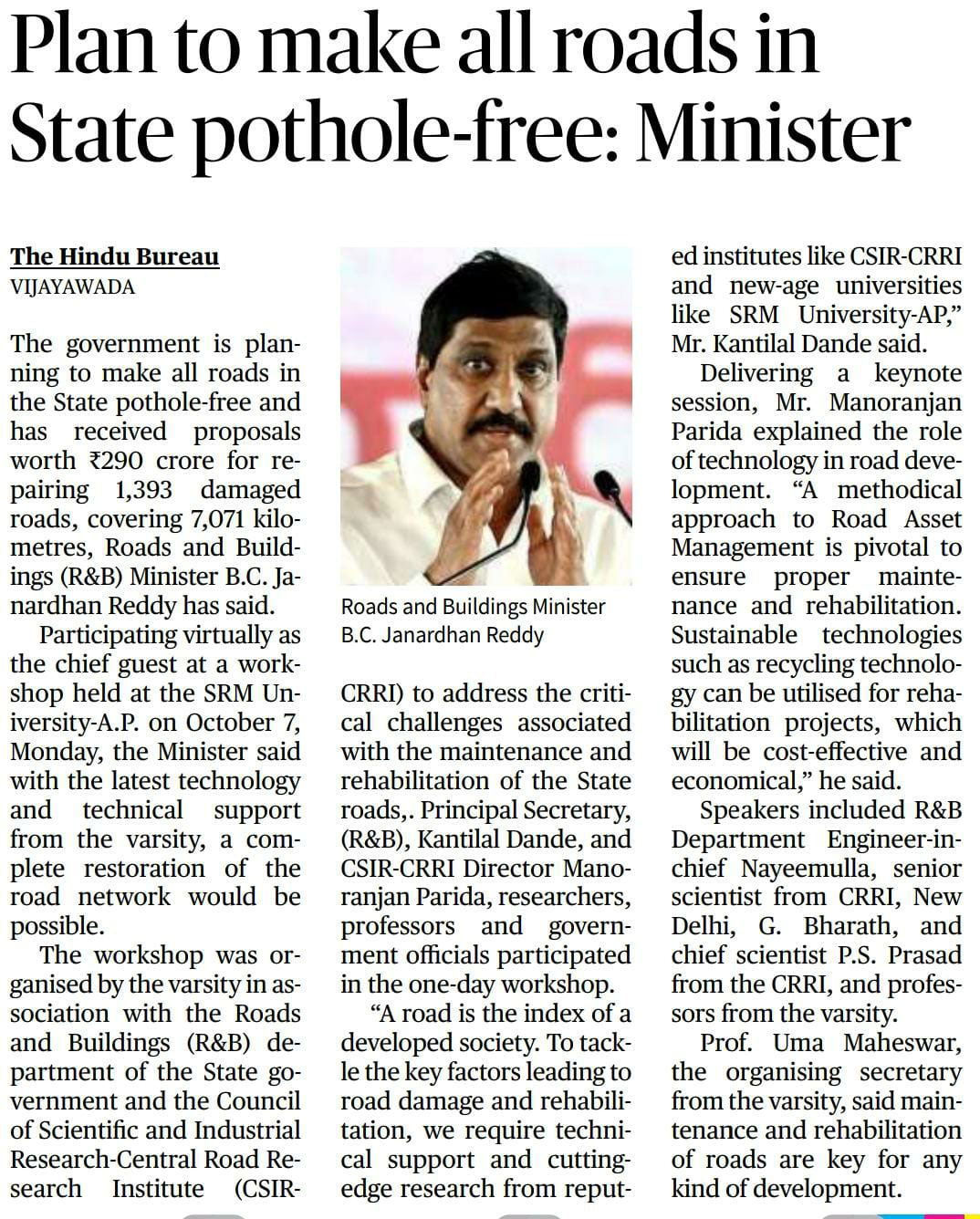
The Pioneer
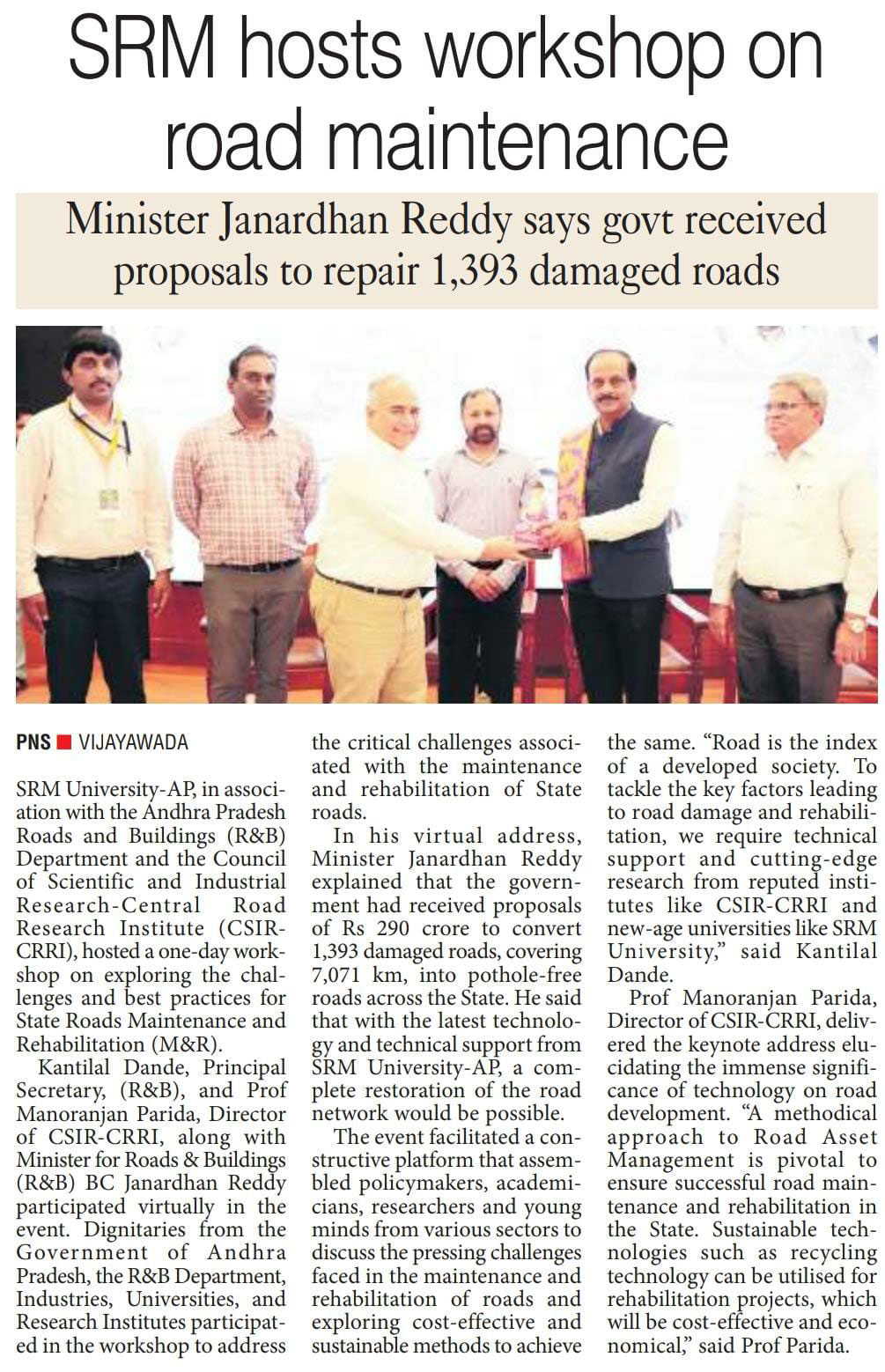
The Hans India
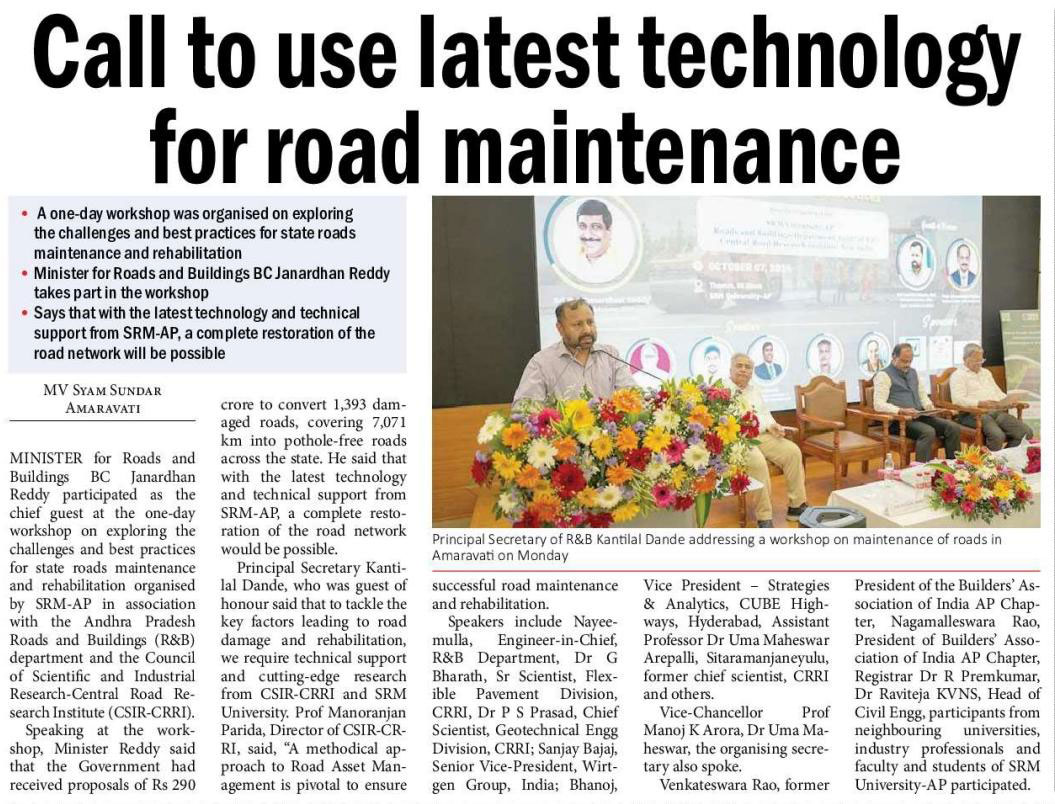
The New Indian Express
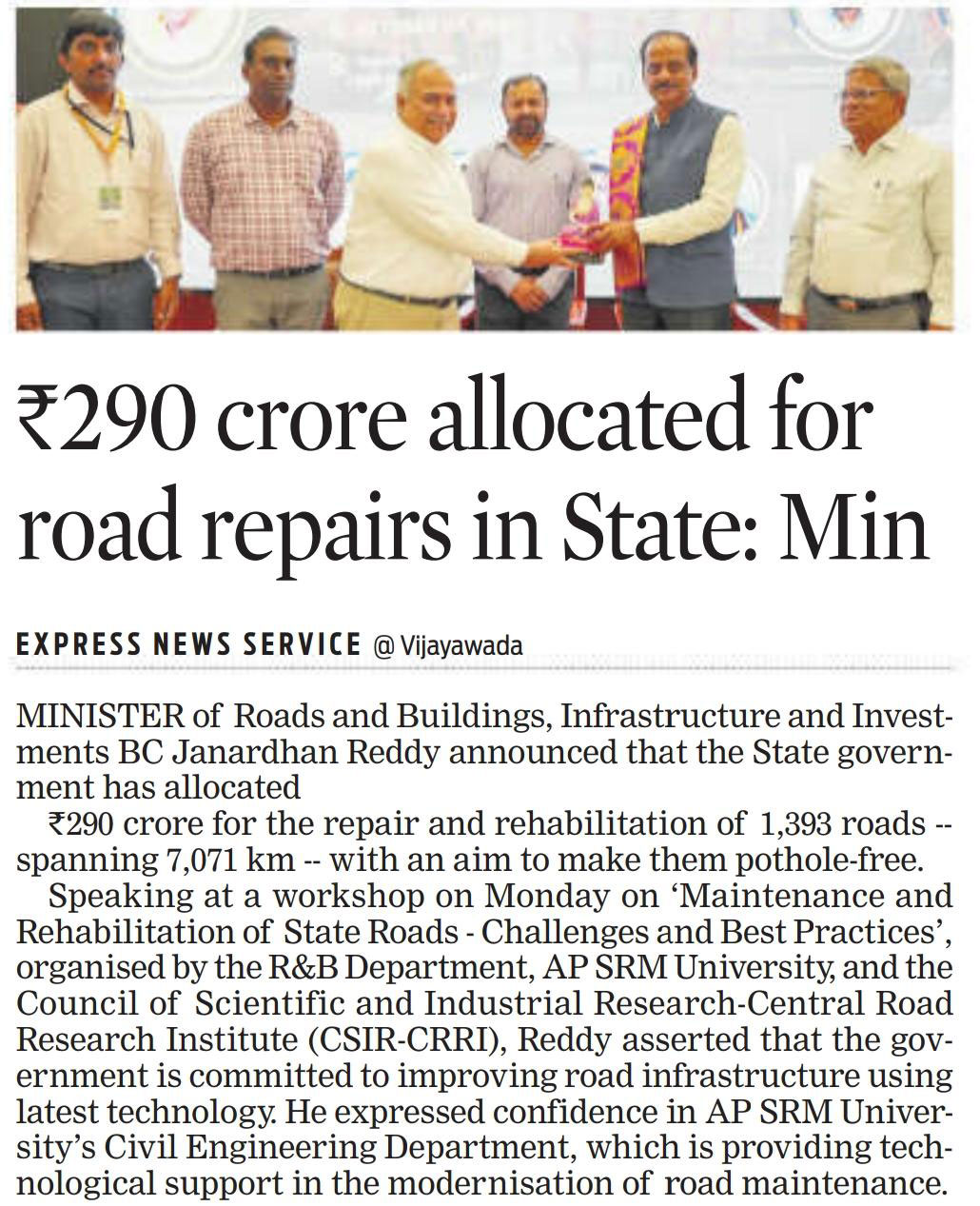
Eenadu
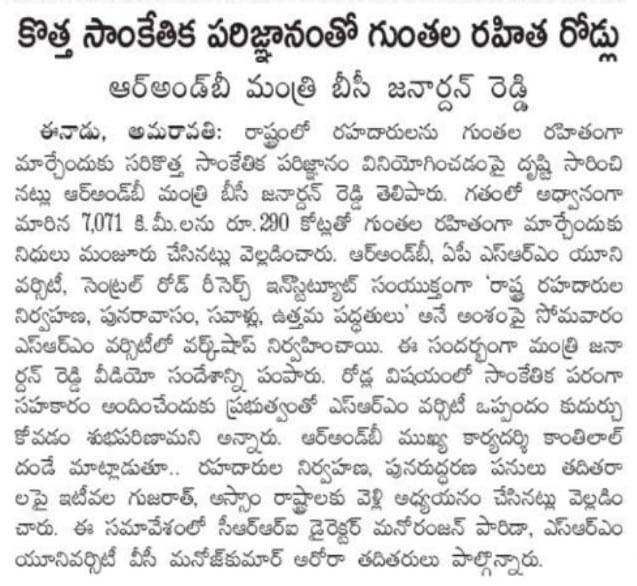
Andhra Jyoti
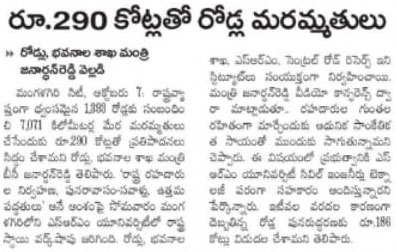
Vartha Prapancham
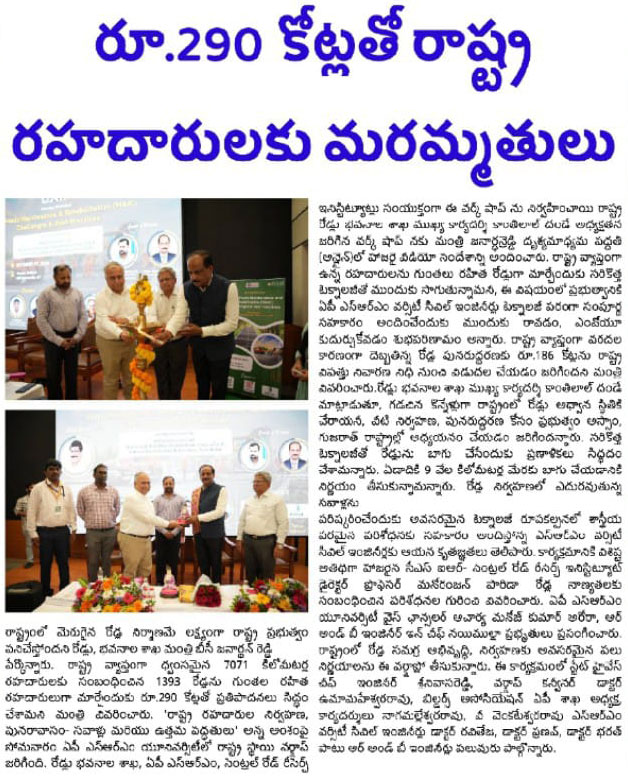
Surya
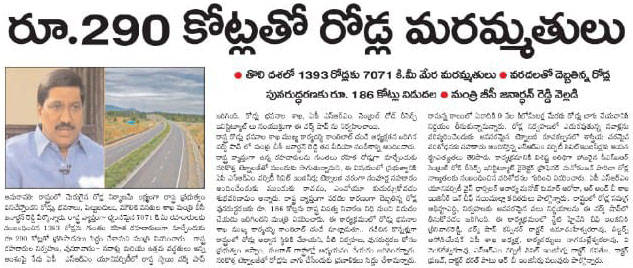
Andhra Prabha
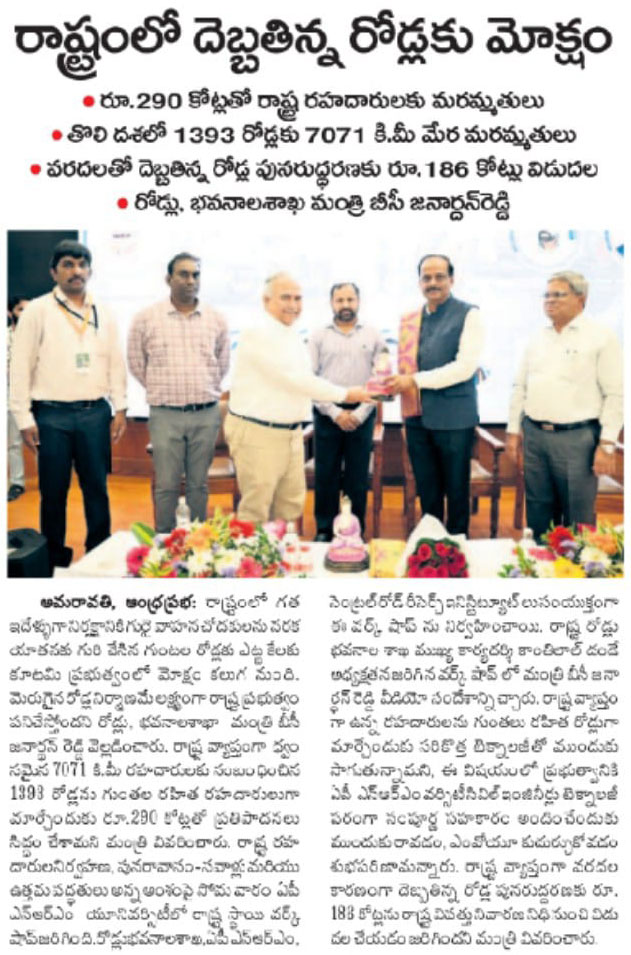
Vartha
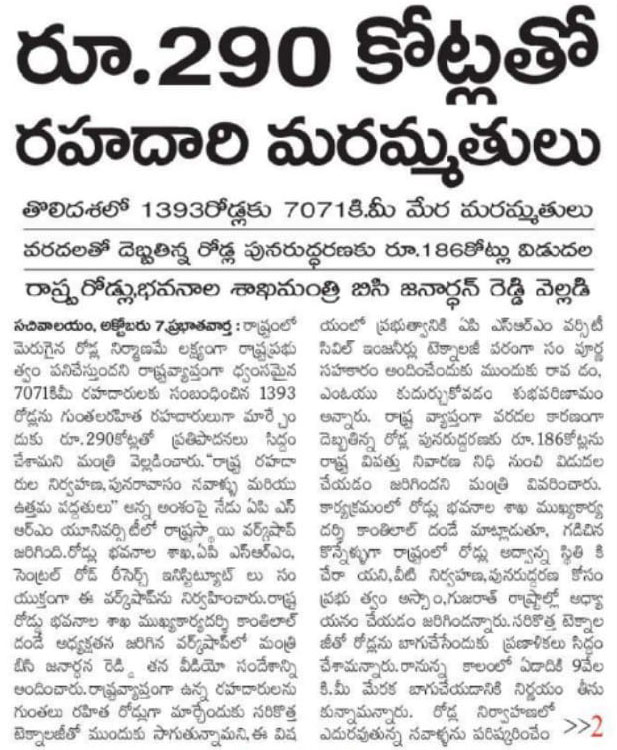
- New Theories on Dark Matter: Dr Basabendu Proposes New Insights in Q1 Journal October 4, 2024
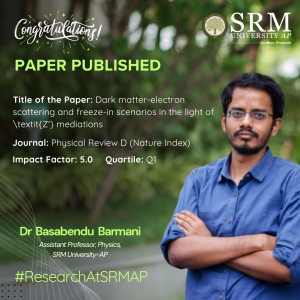 In a significant advancement in the field of astrophysics, Dr Basabendu Barman, Assistant Professor in the Department of Physics, has published a groundbreaking paper titled “Dark matter-electron scattering and freeze-in scenarios in the light of \textit{Z’} mediation” in the prestigious Q1 journal, Physical Review D, known for its impact factor of 5.0 within the Nature Index.
In a significant advancement in the field of astrophysics, Dr Basabendu Barman, Assistant Professor in the Department of Physics, has published a groundbreaking paper titled “Dark matter-electron scattering and freeze-in scenarios in the light of \textit{Z’} mediation” in the prestigious Q1 journal, Physical Review D, known for its impact factor of 5.0 within the Nature Index.Dr Barman’s research delves into the enigmatic realm of dark matter, proposing a novel mechanism through which dark matter might interact with the visible universe via a hypothesised fifth force. This interaction could provide vital insights into the nature of dark matter and its elusive characteristics. The study suggests that if this interaction is confirmed, experiments exploring the existence of a fifth force could concurrently unravel the mysteries surrounding dark matter, leading to a deeper understanding of the universe.
This publication not only highlights the potential for new discoveries in particle physics but also positions SRM University-AP at the forefront of cutting-edge research in dark matter studies. Dr. Barman’s findings could pave the way for further exploration and experimental validation, ultimately contributing to the ongoing quest to decode one of the universe’s greatest mysteries.
Abstract:
We investigate dark matter (DM-)electron scattering in a minimal U〖(1)〗_X extension of the Standard Model (SM), where the DM can appear as a Majorana fermion, a complex singlet scalar, or a Dirac fermion. To study bounds on the new gauge coupling and new gauge boson mass, from DM-electron scattering, we consider several direct search experiments like CDMS, DAMIC, SENSEI, PandaX-II, DarkSide-50, and XENON1T-S2 for different U〖(1)〗_X charges. In this setup, we consider DM production via freeze-in in both radiation-dominated and modified cosmological backgrounds to project sensitivities onto coupling vs mass plane satisfying observed relic abundance. DM-electron scattering could provide comparable, or even stronger, bounds compared to those obtained from the electron/muon (g-2), low-energy scattering, and intensity frontier experiments within mass range of 0.01-0.1 GeV. Constrains from freeze-in could provide stronger sensitivities for new gauge boson masses above about 1 GeV ; however, these limits are comparable to those obtained from LHCb and LEP experiments for mass between 10-150 GeV. In the future, electron-muon scattering (MUonE), proton (FASER and DUNE), and electron/positron (ILC) beam-dump experiments could probe these parameters.
From Layperson’s perspective:
We know there are four fundamental forces in nature: strong, weak, electromagnetic, and gravitational. But what if there’s a hidden, fifth force we haven’t discovered yet? The Standard Model of particle physics, which organizes all known particles, doesn’t include this fifth force (and doesn’t include gravity either, unfortunately). So, how can we theoretically create a particle physics model for this possible fifth force? That’s what we explore in this paper. Interestingly, there are already experiments (for example, the Large Hadron Collider or LHC at CERN, Geneva) searching for signs of fifth forces. If this force exists, our model could be tested by these experiments. But there’s more! We also wanted to tackle a big mystery in cosmology: dark matter. Dark matter makes up about 24% of the universe, but we’ve never directly detected it because it doesn’t reflect light—it’s “dark.” However, there are smart ways to try to find it. In this paper, we propose how the same dark matter might interact with the visible universe through this fifth force and thereby leave their footprints. If true, therefore, the experiments looking for the fifth force could also give us clues about the nature of dark matter.
Title:
Dark matter-electron scattering and freeze-in scenarios in the light of Z’ mediation.
In BibTeX (citation) format:
@article{PhysRevD.110.055029,
title = {Dark matter-electron scattering and freeze-in scenarios in the light of ${Z}^{\ensuremath{‘}}$ mediation},
author = {Barman, Basabendu and Das, Arindam and Mandal, Sanjoy},
journal = {Phys. Rev. D},
volume = {110},
issue = {5},
pages = {055029},
numpages = {20},
year = {2024},
month = {Sep},
publisher = {American Physical Society},
doi = {10.1103/PhysRevD.110.055029},
url = {https://link.aps.org/doi/10.1103/PhysRevD.110.055029}
}Practical Implementations & Social Impact:
The primary goal of this study is to explore what lies beyond the known, visible universe. This curiosity has driven humanity for centuries—to build rockets and explore outer space and to smash particles in colliders, searching for the mysteries hidden within the atom. The desire to uncover the unknown, to shed light on the darkness, is a fundamental part of what it means to be human. In this sense, the work contributes to the realm of pure intellectual pursuit. Science speaks the language of data, and data is born from experiments. The validation of any well-constructed theory ultimately depends on experimental evidence. For this reason, it is essential for society to cultivate a culture that values fundamental scientific discussion and increases funding for basic research.
Collaborations:
This work was done in collaboration with Prof. Arindam Das from the Department of Physics, Hokkaido University, Sapporo, Japan, and Dr. Sanjoy Mandal from the Korea Institute for Advanced Study (KIAS), Seoul, Korea.
Future plans:
- A closer look into early universe dynamics by performing more involved simulations.
- Connection between particle physics models and early Universe cosmology.
- Complementary searches from different experiments in unravelling new physics beyond the Standard Model.
- Searching new physics at energy and intensity frontier.
- Ms Sasmita Rout October 4, 2024
- Language Lab to Boost Student Communication Skills October 4, 2024
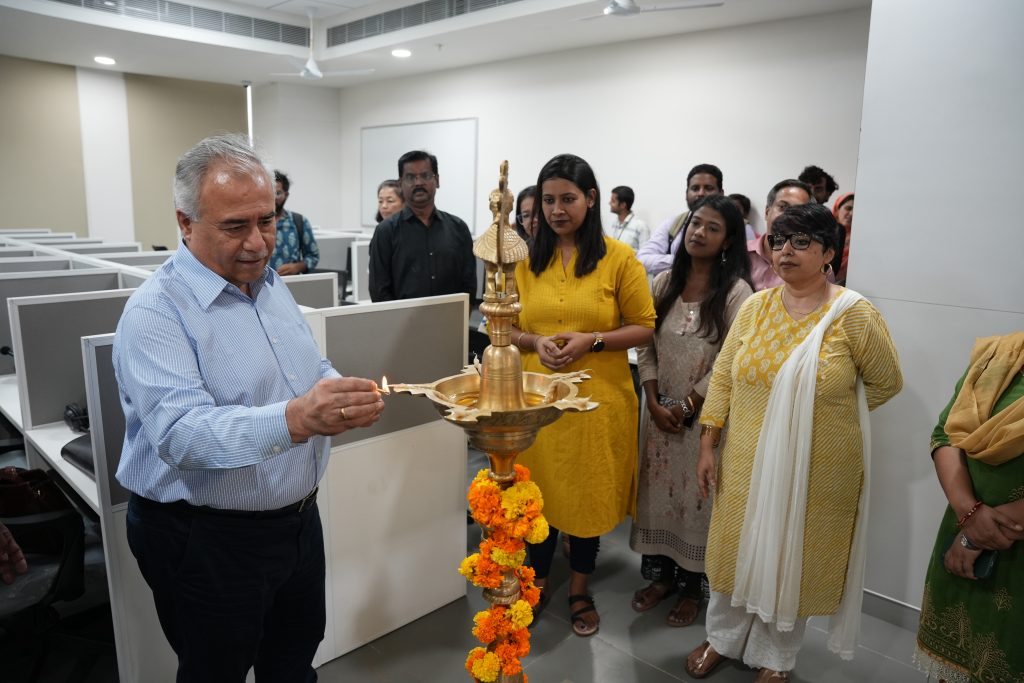 The Department of Literature and Languages at SRM University-AP celebrated the launch of its Language Lab, a state-of-the-art, 70-seater facility designed to enhance the Listening, Speaking, Reading, and Writing (LSRW) skills of its students.
The Department of Literature and Languages at SRM University-AP celebrated the launch of its Language Lab, a state-of-the-art, 70-seater facility designed to enhance the Listening, Speaking, Reading, and Writing (LSRW) skills of its students.The inauguration was witnessed and officiated by the honourable Vice Chancellor, Prof. Manoj K Arora, along with Prof. Vishnupad, Dean- ESLA; Prof. C V Tomy, Dean-SEAS, Dr Vinayak Kalluri, Dean-Academic Affairs, Ms Suma N, CFAO; Dr Sayantan Thakur, Assistant Professor and Head; Dr Karthik Rajendran; Dr Srabani Basu, other faculty members, research scholars and students.
The laboratory, valued at 10 million rupees, is equipped with Sanako and Lanquill software, providing students with access to advanced resources. During the event, Vice Chancellor Prof. Manoj K Arora emphasised the value of communication he stated “Communication is an essential skill. With this lab, our students have a real opportunity to build those skills and contribute meaningfully to society.” he also voiced that, In future, the varsity will also be looking forward to opening this facility to the wider community so that more people can benefit from this resource.
Dr Thakur and Dr Amlan Baisya, Assistant Professors at the university, provided insights into the laboratory’s cutting-edge software and technology. They explained how these tools can significantly enhance the learning experience, making language acquisition more interactive and engaging. The faculty expressed their excitement about the opportunities this facility will create for both students and instructors alike.
Prof. Arora took a moment to commend the Department of Literature and Languages and the Directorate of Information Technology and Knowledge Management (ITKM) for their commitment to advancing education through innovative resources. He underscored the bright future ahead, not only for students but for the entire university community, as they leverage this new laboratory to improve communication skills that are vital in both academic and professional settings.
Continue reading → - Dr Sayantan’s Research Paper on Overcoming the Digital Divide October 4, 2024
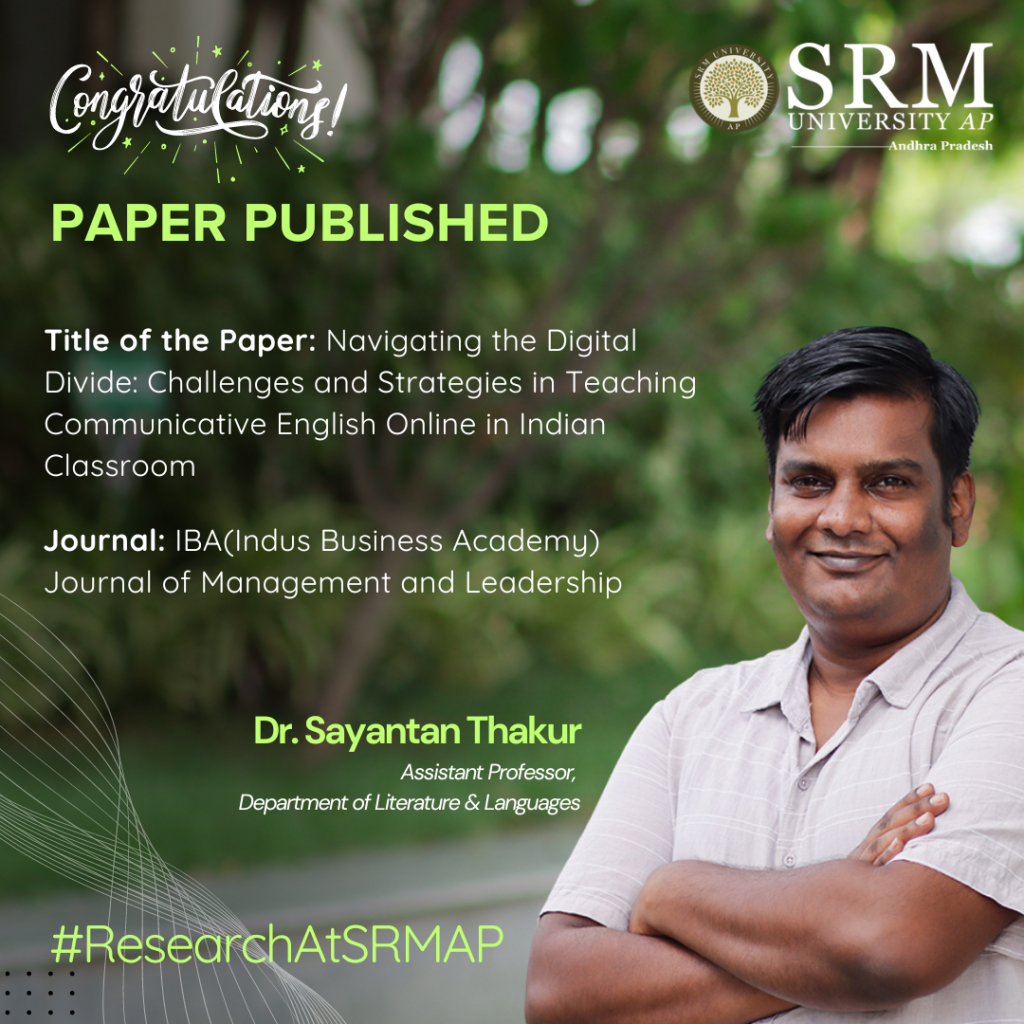
In the context of online English education in India, the “digital divide” has emerged as a significant obstacle, especially for students from rural or underprivileged areas. Dr Sayantan Thakur, Assistant Professor at the Department of Literature and Languages in his article introduces a research study titled “Navigating the Digital Divide: Challenges and Strategies in Teaching Communicative English Online in Indian Classrooms,” which aims to address the unequal access to online learning tools.
Abstract
The advent of online learning platforms is providing new opportunities for English language learning (ELL) in India. However, there is a significant challenge posed by the digital divide – the gap in accessing technology. This study investigates what causes the digital divide in internet ELL classrooms such as infrastructure limitations, device ownership and usage, and digital literacy skills; and how they affect student engagement, development of communication skills, and overall learning experiences. It suggests ways to bridge this gap which include government policies on infrastructure development; affordable tech solutions like mobile apps; teaching programs that enhance digital literacy among learners; support for teachers involved in web-based pedagogy. Through these recommendations, education stakeholders can create an inclusive cyberspace for all students where their communication abilities will be nurtured throughout different parts of India.
The Practical Implementation
The practical implementation of your research on “Navigating the Digital Divide: Challenges and Strategies in Teaching Communicative English Online in Indian Classrooms” has far-reaching social implications. By addressing the digital divide, your work can help level the playing field in education, especially for students from underprivileged backgrounds.
Improved Access to Education: Implementing strategies like infrastructure development, affordable mobile-based learning tools, and digital literacy programmes can provide more students, especially in rural and low-income areas, access to online English learning resources. This improves their chances of acquiring essential communication skills, opening doors to better job opportunities.
Empowering Teachers: Equipping teachers with digital tools and training enables them to deliver more effective online lessons, increasing student engagement and success rates.
Reducing Inequality: Bridging the technology gap can reduce educational disparities between urban and rural areas, promoting social mobility and reducing the long-term impacts of inequality.
Building a Digitally Literate Society: Enhancing digital literacy among students and teachers fosters a society better prepared for the demands of the modern workforce, ultimately contributing to economic growth and social inclusion.
Future Research Plans
- Regional Literature in Translation
- Tantric Tradition and Eastern Indian Literature
- Folk Music of Bengal
- Indian Philosophy, Aesthetics & Literature
- A Sustainable Greywater Treatment Method October 3, 2024
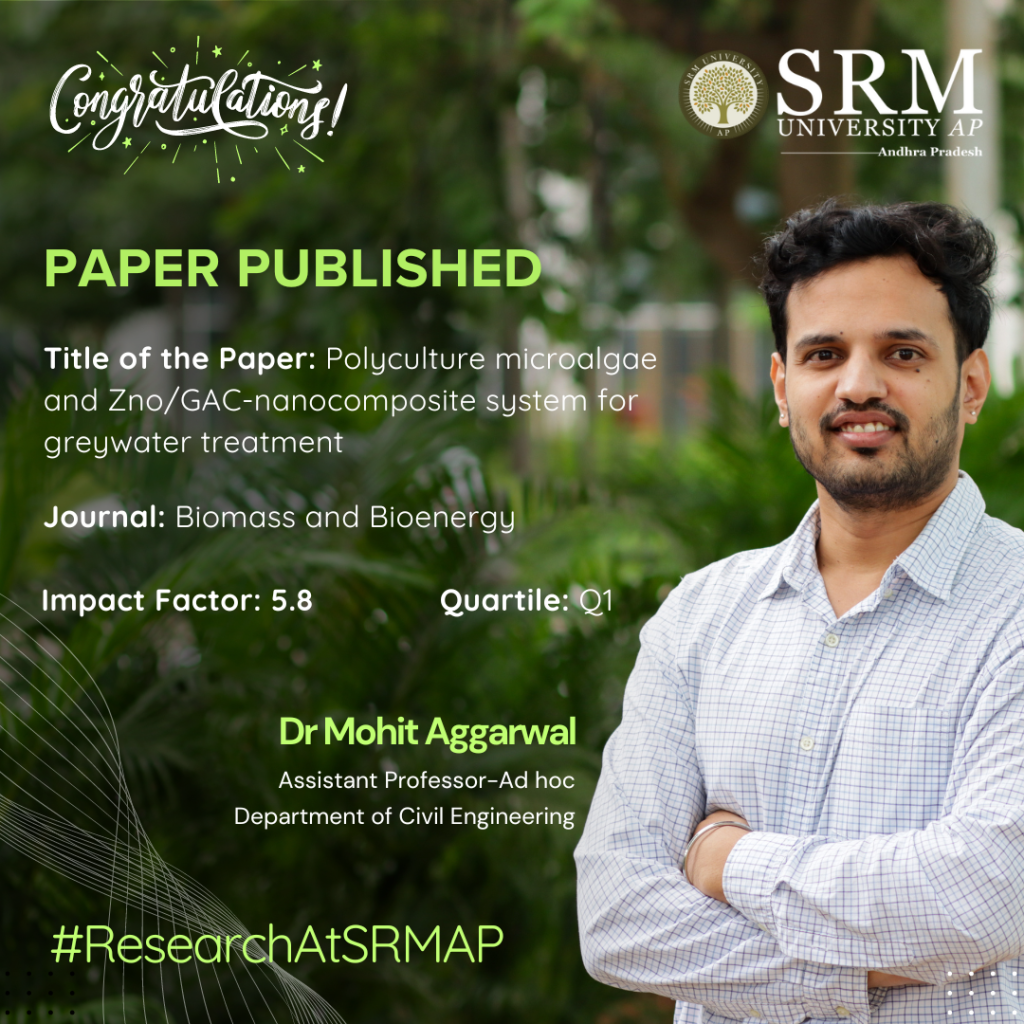
Addressing the ever-demanding crisis of water scarcity, Dr Mohit Aggarwal, Assistant Professor from the Department of Civil Engineering, has published a paper titled “Polyculture Microalgae and Zno/GAC-nanocomposite System for Greywater Treatment” in the Q1 journal Biomass and Bioenergy with an impact factor of 5.8. In his research, Dr Aggarwal explores sustainable methods to treat wastewater with algae and nanoparticles, providing an efficient method to reuse greywater and reduce water consumption.
Abstract
This study explores sustainable greywater treatment using microalgae and a ZnO/GAC nanocomposite in a 15-day batch photobioreactor. The system achieved significant nutrient removal, with 80% TOC, 94.2% PO43−, and 99.6% NH4+ efficiencies. Microalgal growth was enhanced by the nanocomposite, reaching a density of 1.8 g/L. The resulting biomass had a high heating value of 18.32 MJ/kg. The ZnO/GAC nanocomposite maintained effective removal over four cycles. The treated greywater met reuse standards for toilet flushing, with pH 8.5, turbidity <4 NTU, and COD, NH4+, and PO43− of 34, 0.032, and 0.48 mg/L, respectively.
Explanation of the research in layperson’s terms
Water scarcity and pollution are serious problems, and our research aims to find an environmentally friendly way to treat greywater (wastewater from sinks, showers, etc.). We explored the use of algae combined with special nanoparticles (zinc oxide) to clean the water more effectively. The algae grow in the water and help remove harmful substances like carbon, phosphorus, and nitrogen. The nanoparticles make this process even more efficient.
After treatment, the water is clean enough to be reused, for example, in toilet flushing. This method not only helps clean wastewater but also provides a sustainable way to reuse it, which can reduce water consumption and help the environment.
Practical implementation/ Social implications of the research
Practical implementation
The system developed in this research can be implemented in decentralised greywater treatment units, especially in water-scarce areas. It provides a cost-effective, eco-friendly solution for treating household or industrial greywater. The treated water meets the quality standards for reuse in applications like toilet flushing or landscape irrigation, reducing freshwater demand.
Social implications
This research promotes water recycling, contributing to sustainable water management practices and helping to address water scarcity issues. This can improve access to water in communities with limited resources, reduce the pressure on freshwater supplies, and lower the environmental impact of wastewater discharge, leading to healthier ecosystems and communities. Additionally, adopting such systems on a larger scale can foster greater awareness of water conservation and responsible resource usage.
Continue reading → - Dr Aguru Aswani Devi October 1, 2024
- Marketing Wizard Delivers Lecture on D2C Marketing September 30, 2024
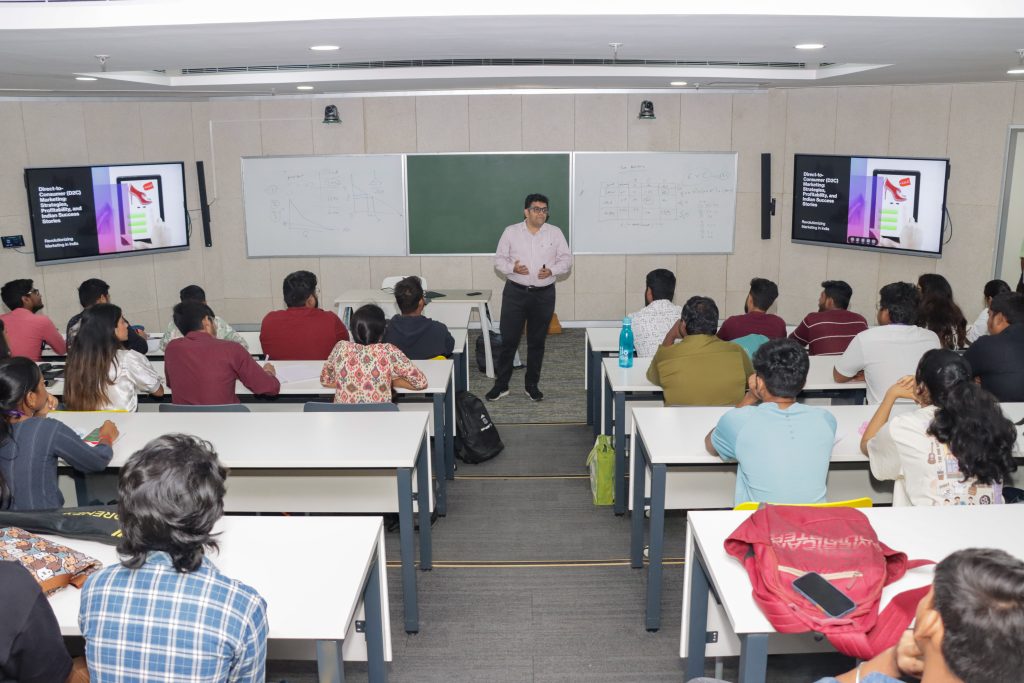 The students of Paari School of Business (PSB) had a memorable experience when Mr Siddesh Joglekar joined as a guest lecturer at SRM University-AP. The CRCS team’s dedicated efforts and the unwavering support of Prof. Bharadwaj Sivakumaran, Dean of PSB, made this unique opportunity possible. Students had the privilege of engaging in a personal interaction with the esteemed guest on September 18, 2024.
The students of Paari School of Business (PSB) had a memorable experience when Mr Siddesh Joglekar joined as a guest lecturer at SRM University-AP. The CRCS team’s dedicated efforts and the unwavering support of Prof. Bharadwaj Sivakumaran, Dean of PSB, made this unique opportunity possible. Students had the privilege of engaging in a personal interaction with the esteemed guest on September 18, 2024.During the lecture Mr Joglekar shed light on various aspects of professional growth and marketing strategies. He placed significant emphasis on the need to foster a collaborative environment and recognising the contributions of peers.The lecture also delved into the imporatance of networking for career advancement, especially through ones’ Alumni Associations
Mr Joglekar delved into the expansive potential of Direct to Consumer (D2C) marketing, using examples from renowned companies like Twitter, Walmart, Instagram, Zomato, Amazon, Tesla, and Google to illustrate the evolution of brand images. A poignant quote from Mr Joglekar, “Companies are transformed into brands by people who dare to dream,” encapsulated the essence of the discussion, emphasising the role of visionary individuals in shaping successful brands.
Interactive elements were woven into the session, including an activity where students were tasked with creating logos that branded themselves, thus reflecting a unique aspect of their identity. This hands-on approach not only made the learning process engaging but also provided practical insights into branding.
A comparative analysis between traditional retail and D2C highlighted key differences such as distribution channels, pricing strategies, and brand control, offering a deeper understanding of the contemporary marketing landscape. The concepts of Customer Acquisition Cost (CAC) and Life-Time Value (LTV) were also explored, underscoring their importance in building a strong brand identity.
As the session neared its conclusion, Mr Joglekar introduced an innovative activity that involved reverse engineering an advertisement concept, inspired by the 2022 ad campaign featuring Mr Neeraj Chopra for Cred. This exercise prompted students to think creatively and apply the concepts discussed in a practical context.
The session wrapped up with a Q&A segment, where discussions ranged from market profitability to the advantages of D2C marketing, allowing for a comprehensive review of the topics covered. Ms Andrea Benedict extended a vote of thanks on behalf of the student fraternity of PSB, culminating in a group photo session that captured the essence of the enriching experience.
Continue reading → - ALOHA 2024: SRM University AP Freshers’ Extravaganza September 30, 2024
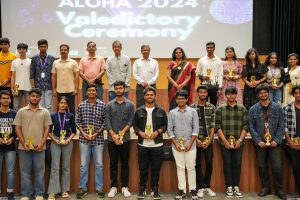 SRM University-AP celebrated Aloha 2024, a welcome to the freshers on this erudite journey. The freshers Party 2024 was an exhilarating two-day celebration filled with entertainment, talent, and camaraderie. The event welcomed freshers with a wide range of activities, competitions, celebrity appearances, and delicious food, ensuring a grand introduction to university life.
SRM University-AP celebrated Aloha 2024, a welcome to the freshers on this erudite journey. The freshers Party 2024 was an exhilarating two-day celebration filled with entertainment, talent, and camaraderie. The event welcomed freshers with a wide range of activities, competitions, celebrity appearances, and delicious food, ensuring a grand introduction to university life.The festival began with an Inauguration Ceremony, during which dignitaries and guests lit the ceremonial lamp, symbolising new beginnings. Their words of encouragement and advice set the tone for the exciting events to follow. The festival came alive with a variety of Club Competitions, where students showcased their talents in dance, theatre, music, and other creative arts. These competitions not only brought out the freshers’ hidden talents but also fostered a sense of teamwork and fun.
The highlight of the evening was the Neon Arcade, a unique gaming zone set up with vibrant neon lights that gave a nightclub-like atmosphere. Freshers enjoyed arcade games, including bowling, under glowing lights, making it an unforgettable experience. This creative setup became one of the festival’s most talked-about features.
Meanwhile, food stalls lined the venue, offering a wide range of mouth-watering options. From street food to global cuisines, these stalls kept everyone refreshed and energised throughout the day.
Simultaneously, esports enthusiasts engaged in Esports Competitions featuring popular games like FIFA, Valorant, Free Fire, and BGMI. The fierce yet friendly competition made this segment a crowd favourite, drawing both players and fans to experience the excitement.
As with Day 1, the food stalls continued to offer a delightful culinary experience, ensuring that students had plenty of delicious options to enjoy between activities.
Continue reading →
In the evening, the excitement reached its peak with the arrival of Nara Rohit, a famous Telugu actor, who visited the campus along with his co-stars to promote his upcoming film. The audience was thrilled as Nara Rohit interacted with fans, shared insights about his movie, and posed for photos. His presence added a touch of glamour to the festival, making Day 2 even more special.


